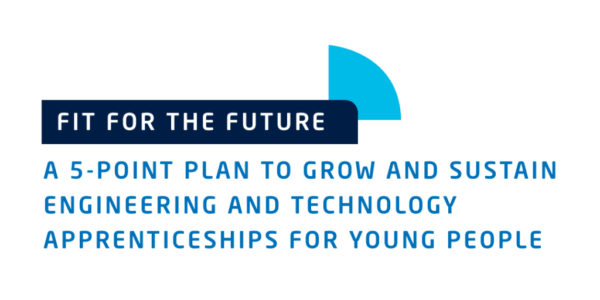Engineering UK have released their latest report, ‘Fit for the future: a 5-point plan to grow and sustain engineering and technology apprenticeships’ led by Lord Knight and Lord Willetts.
The cross-plan was developed after a comprehensive inquiry looking at solutions to reverse the worrying decline in apprenticeship starts seen in the sector in recent years. Without an increase in the number and diversity of engineering and technicians, the UK lacks the capability to tackle some of the biggest challenges we face, from energy security through to sustainable farming, house building and advancements in life sciences.
Key Findings
- Engineering generates up to an estimated £645bn gross value added (GVA) to the UK’s economy annually – equivalent to 32% of the country’s economic output.
- Vacancies for ‘green engineering’ roles in the UK have increased by more than half (55%) over the last 5 years.
- Research reveals that engineering occupations account for 19% of current jobs but for 25% of all job postings in the past year. This suggests that the current skills shortage in engineering is greater than in other employment areas, or that employers are hiring for future growth or most likely, a combination of the two.
- The apprenticeship route has not served young people as well as other comparable countries, like Germany where 88% of apprenticeship starts are under the age of 24. The decline in the number of apprenticeships starts has been driven by a decline in lower-level apprenticeships, particularly intermediate apprenticeships (Level 2).
- Evidence suggests that many businesses, particularly smaller firms, are struggling to find the capacity and resources to take on young apprentices, and companies are concerned about the quality of training provision and barriers in relation to apprenticeship standards and bureaucracy.
- Barriers: Not enough young people are aware of the value, or apprenticeship options open to them or know where to start; financial barriers and entry requirements are also impacting on access to apprenticeships.
- The impact of the pandemic has taken its toll, making it harder for young people to navigate their next step into FE, HE or employment.
- UCAS – plans to broaden their search and application hub. In February 2023, it was announced that young people would be able to use UCAS to search and apply for apprenticeships, alongside degrees (starting from 2024). It will also display different pathways into individual career areas, meaning that if a student is interested in, for example, engineering, they will see the undergraduate and apprenticeship routes set out side-by-side.
- Youth Employment UK’s 2022 Youth Voice Census found that whilst 83.2.% of young people had apprenticeships discussed with them once or more in secondary school, only 29.3% of young people said that they were either likely, or very likely to apply for an apprenticeship (this compares to 65% for university).
- HR teams’ report, ‘Scaling Up Skills’, sets out feedback from small firms on the administrative, cost and supervision implications of recruiting and training apprentices. The report advocates for increased support for SMEs including greater financial incentives targeted at those taking on young apprentices.
Causes for concern
- Level 2 and 3 apprenticeships are declining.
- Participation is falling most amongst younger age groups.
- Proportionally, fewer SMEs are engaging with apprenticeships.
- Apprenticeship starts by people from the most deprived backgrounds are declining.
- Apprenticeship opportunities are not evenly distributed.
- Awareness of apprenticeships among young people and parents is still too low.
- Only 14% of those starting an apprenticeship in engineering and technology are female.
Recommendations
Based on insights gathered from businesses, education providers and young people, the report contains 5 key policy recommendations for all political parties. It calls on government, along with employers and providers, to work together, to rebalance and refocus apprenticeships to make them accessible for young people.
Employers taking action:
- We ask that engineering, technology and manufacturing businesses work more closely with training providers in their area, supporting teaching quality through releasing more staff to teach apprenticeship courses in the sector.
- We recommend that businesses include the number and percentage of apprenticeships in their organisation who are female in their gender pay gap report.
- We ask that engineering and technology employers rise to the challenge of skilling the next generation of engineers and technicians and offer more apprenticeship opportunities to young people including those who do not currently meet minimum maths and English requirements before starting their apprenticeships.
Support young people:
- We ask that government expand its pre-apprenticeship offer for young people ages 16 to 18, by building and improving on existing programmes such as the T level transition programmes and traineeships, and by continuing to fund BTECs as a pathway alongside T levels.
- We recommend that government amend child benefit rules to ensure that child benefit is maintained for apprentices that are under the age of 20.
- We recommend that government work with local and combined authorities to develop a package of support for apprentices up to the age of 25 in entry-level and low paid work that addresses concerns regarding travel costs and from their employer and training provision.
- We call on the government to review the approach to functional skills requirements within apprenticeships and consider proposals for increasing access for young people, including the potential for a reshaped route to gaining these functional skills. Such a review would examine the barriers for young people under the current system, draw on the views and experiences of young people, providers and employers and engage the assessment industry in the development of more work related functional skills qualifications.
Rebalance Education – we recommend that government:
- Directs and supports all schools to offer a broad and more balanced curriculum up to the age of 16 that enables young people to acquire knowledge and skills that are relevant to a variety of careers and to a diversity of learners and enables ongoing access to hands-on subjects such as design and technology during key stages 3 and 4.
- Continues to fund a range of qualifications at 16, including BTECs to ensure that more young people can gain qualifications that will open up pathways into further education, apprenticeships and beyond.
- Replaces the EBacc and Progress 8 accountability measures for schools to better reflect the breadth of qualifications and pathways that should be available to and valued by schools, young people and their parents.
- We recommend that government develops a new careers strategy with access to and parity of esteem between technical and academic pathways as well as increasing diversity throughout these pathways at its heart, and works with the engineering, manufacturing and technology community to bring the opportunities afforded by these pathways to life.
Refocus funding:
- We recommend that government looks to funding degree apprenticeships through the standard higher education fees and loans model and urge the government to reduce the overlapping bureaucratic burdens on degree apprenticeships.
- We recommend that, as soon as the fiscal situation allows, government funds apprenticeships for 16-19 year olds through an increase in the Education and Skills Funding Agency budget.
Enable businesses:
- We recommend that IfATE works with a broad range of engineering and technology employers, including more SMEs and engineering consultancy firms, as well as Professional Engineering Institutions, to rationalise current apprenticeship standards in engineering, manufacturing and technology to ensure that future apprenticeships standards enable apprentices to gain core transferable engineering skills and knowledge valued by their employers. Alongside this, we recommend that IfATE work with businesses across the engineering manufacturing and technology sectors to develop a set of more flexible modules that complement a rationalised suite of apprenticeship standards.
- We recommend that local and combined authorities work with Group Training Associations across England to support engineering and manufacturing SMEs with the recruitment of apprentices, training, access to the levy funds and wider funding issues, and the successful delivery of apprenticeships.
- We recommend that government works with IfATE and the engineering and technology community to ensure that resource-heavy apprenticeships courses with a strategic importance to the economy are assigned sufficient funding to enable education providers to attract good quality teaching staff and to ensure that they are economically viable for education providers to run in locations across the country.
- We recommend that government develops and expands existing models of residential apprenticeships.







